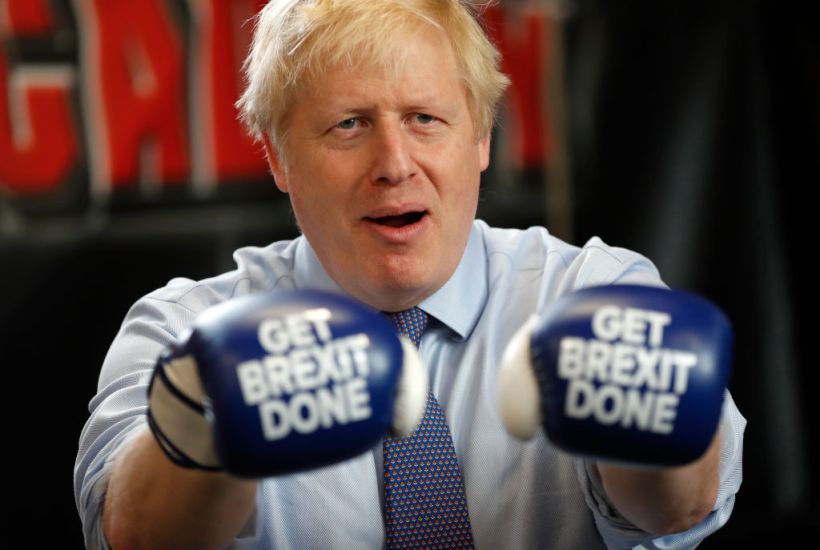If Boris Johnson wins a clear majority on 12 December, it could mark a big turning point in British history. The brakes will be off for the United Kingdom to formally leave the European Union by 31 January 2020. Then the new Tory government will decide how radical its future relationship with the European Union and the rest of the world should be. Make no mistake: this election matters and will be talked about in years to come.
World war one and two both wrought significant change to Britain. So, too, did the 1956 Suez debacle, which drained British self-confidence to such an extent that the country lurched into over-reliance on the USA and then the European communities. It led ultimately to 1973’s European Communities Act that sealed British EEC membership. But far from being a panacea, this sequence of events gradually fractured Britain’s politics and eventually its society. The 1982 Falklands war primed Margaret Thatcher for radical transformation of Britain. While the 2003 Iraq war tarnished Blairism, radicalised the Labour party and eventually denied Britain a viable political opposition. So how might a big Boris victory change the United Kingdom?
Historians, of course, continually disagree about what constitutes turning points in history. They are also even less reliable in predicting them than economists are at forecasting recessions. But there is a good reason why they are hard to anticipate: not all ‘turning points’ lead to lasting change. The great English historian AJP Taylor famously remarked of Germany in the 1848 liberal revolutions that spread across the European continent: ‘German history reached its turning point, and failed to turn’. ‘This was the fateful essence of 1848,’ he concluded.
No matter how much the Prime Minister repeats his ‘get Brexit done’ slogan – and whether or not Boris wins a big majority – post-Brexit Britain will still be a country of two camps, between those praying that, in 2020, the country fails to turn (and stays put in the EU) and those willing a radical turn away from the EU. ‘No-turners’ hope the hard-nosed reality of negotiating a future relationship with Europe in such a tight timescale will grind the new Conservative government into accepting a relationship with the EU that is Brexit in name only, as former ambassador to the EU Sir Ivan Rogers explains on Coffee House.
The ‘turners’ will press strongly for minimal ties to Brussels, more than happy to resort to the quick fix of ‘no deal’, World Trade Organisation rules and sparkling new trade deals with the non-EU world. For opponents, the ‘fateful essence’ of a ‘no-turn’ would be a divine surprise. For supporters, it would be the extreme disappointment of a road not taken, like 1848 Germany for AJP Taylor: ‘the German people stepped on to the centre of the German stage only to miss their cue once more.’
As yet we have no idea how long the full Brexit process will take, how radical the transformation or who might judge it to be a turning point. AJP Taylor wrote his account of German history in 1945 through the lens of 22 years of extreme German dictatorship. A century on, he viewed 1848 as the missed opportunity for Germany to leave the path of authoritarianism.
But turning points, as historians are only too aware, can also turn in the most unlikely directions. Like revolutions, they can end up devouring their creators. Within two years, the 1848 liberal revolutions were crushed and the authoritarian regimes that sparked them were restored. But while things looked the same, they weren’t. In the minds of Europe’s middle-classes, the status quo was dead. Mindsets and ideas were irremediably changed. In Germany’s case, the consequence was fateful: ‘The success of the revolution discredited conservative ideas; the failure of the revolution discredited liberal ideas.’ And so, as Taylor chillingly reminds us: ‘After it, nothing remained but the idea of Force, and this idea stood at the helm of German history from then on.’
German history is no template for how Britain might change after 2020. Most likely – in that very British way – change will be moderate. There will be some loosening of ties to Brussels, a few new trade deals; neither ever-closer union, nor Singapore-style capitalism. But if in the next two years the ideas that buttress the Remain and Leave camps emerge discredited in equal measure in the eyes of the British people, Brexit could be the turning point that set the United Kingdom on a baleful path no historian could have predicted.
John Keiger is a former professor of international history in the Department of Politics and International Studies, University of Cambridge
Got something to add? Join the discussion and comment below.
Get 10 issues for just $10
Subscribe to The Spectator Australia today for the next 10 magazine issues, plus full online access, for just $10.




















Comments
Don't miss out
Join the conversation with other Spectator Australia readers. Subscribe to leave a comment.
SUBSCRIBEAlready a subscriber? Log in